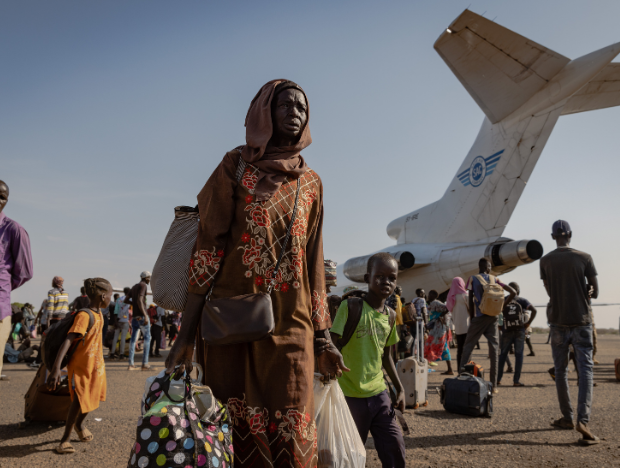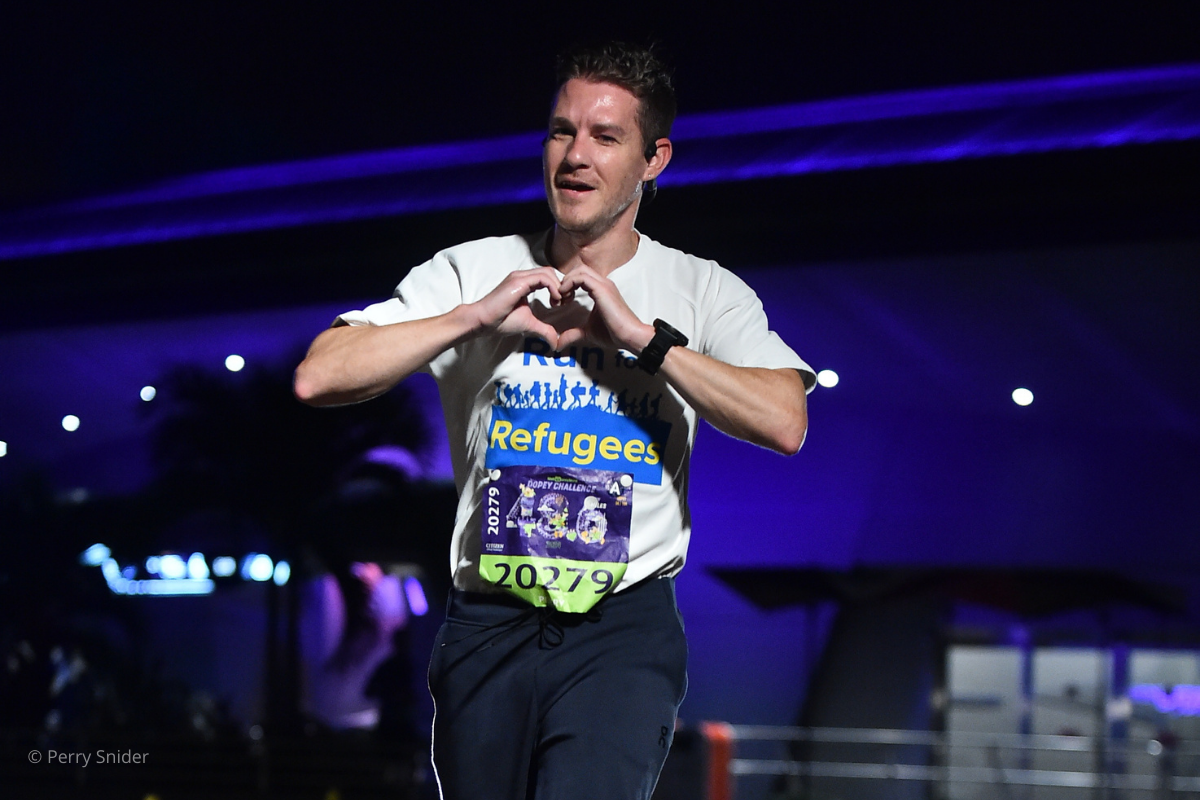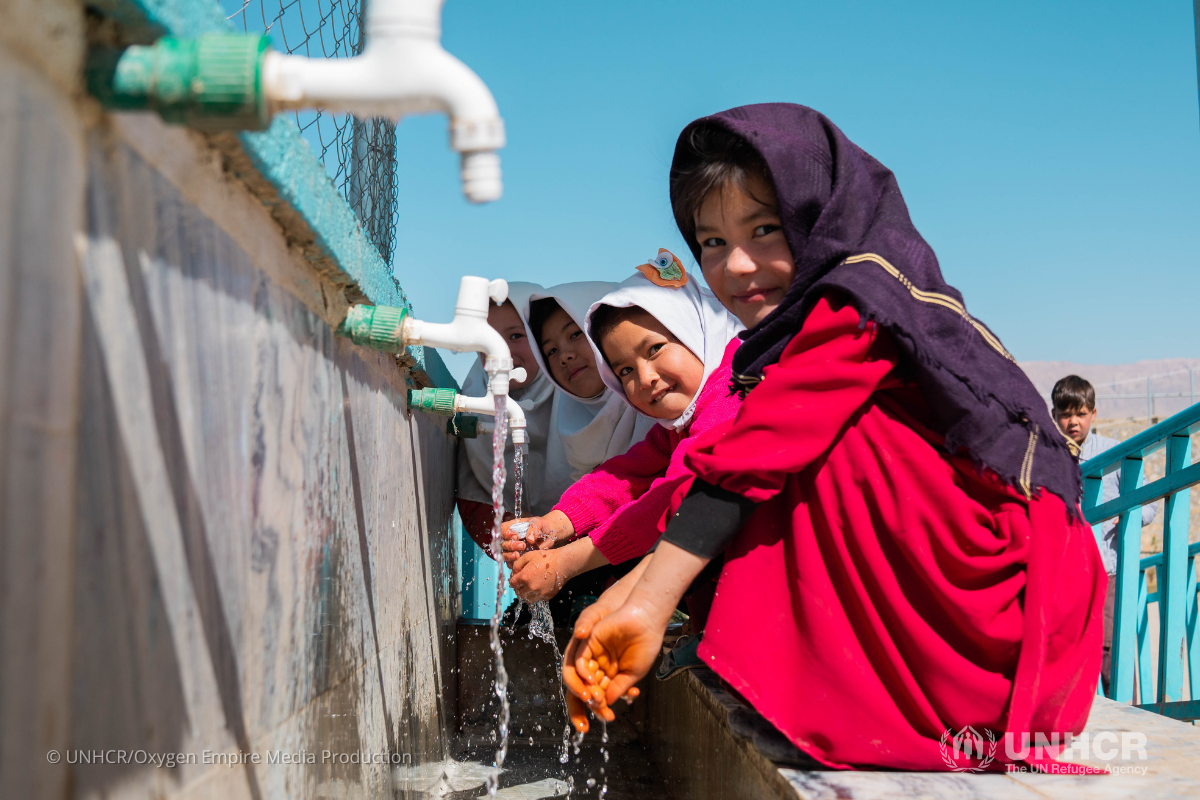Rebuilding futures: How UNHCR is empowering Syrian refugees through mental health support
Over the last 12 years, the Syrian people have endured war, displacement and heartbreak, leaving many with physical and emotional scars. According to the World Health Organization (WHO), individuals living in protracted conflicts in countries like Afghanistan, Iraq, South Sudan and Syria are more susceptible to experiencing mental health issues than those in non-conflict affected populations. In fact, the WHO reports that 22 percent of people who have experienced war or other conflicts in the previous 10 years will suffer from depression, anxiety, post-traumatic stress disorder, bipolar disorder or schizophrenia.
In Syria, the prevalence of mental health conditions is high, with approximately one in 10 people expected to be living with mild to moderate mental health conditions, and one in 30 suffering from more severe conditions due to prolonged exposure to conflict.
For many displaced Syrians, the journey does not end when they are resettled in a new country. The loss of community, family and home can create a sense of hopelessness and despair that persists long after they find safety. Additionally, rebuilding a life in a new country, learning a new language and navigating unfamiliar systems can take an additional toll on their mental health.
For millions of displaced Syrians, the last 12 years have been devastating and new displacements caused by disasters and other crises, such as the COVID-19 pandemic and economic turmoil, have further exacerbated mental health needs.
Despite these challenging circumstances, displaced individuals like the Al-Hleil family, Nidal and Khalsa have received the care they need—with the help of UNHCR—and have been able to overcome so much in the face of adversity.
The Al-Hleil Family
 In the early days of the conflict in Syria, Hala, her husband and their children were forced to flee their home in Hama, Syria, due to increased violence in the region. The family sought refuge in Lebanon, but their struggles were far from over.
In the early days of the conflict in Syria, Hala, her husband and their children were forced to flee their home in Hama, Syria, due to increased violence in the region. The family sought refuge in Lebanon, but their struggles were far from over.
As the conflict in their country continued to drag on year after year, their resources in Lebanon became increasingly stretched and their debts began to pile up.
Hala’s three older children were forced to make the difficult decision to drop out of school, and her eldest son, sixteen-year-old Amer, began working to supplement his father’s income. Alongside the trauma of displacement and war, the impacts of their struggle began to take a toll on the family's mental health.
“One thing after another, everything that I have done in the last six to seven years is gone, nothing left,” says Hala’s husband Yasser. “The situation is very hard, it got inside of us, the children were affected and depressed.”
When the pandemic hit, the family was pushed further to the brink. Due to the COVID-19 lockdown, the Lebanese economy took a downward spiral, pushing many Syrian refugees like the Al-Hleil family further into poverty.
Both Yasser and his son lost their jobs during the pandemic, leaving the family struggling to put food on the table and fearing eviction from their small damp apartment, which left two of their youngest suffering from severe asthma.
The family’s mental health suffered greatly because of the situation, with Hala often spending days unable to get out of bed and both her and her son experiencing suicidal thoughts.
“It's like we’re living a daily war,” says Yasser. “A silent, domestic war,” he continues.
Thanks to a UNHCR partner in Lebanon, Hala received psychosocial support to help her cope with the depression she was experiencing, and for the first time in a long time, she can look forward to special moments with her children.
Nidal
 In 2019, 20-year-old Kurdish refugee Nidal arrived on the Greek island of Chios with his family, after fleeing from the conflict in Syria. Upon arrival, his parents and younger siblings were granted asylum, allowing them to finally leave the island. However, Nidal's asylum claim was still pending. His claim was later rejected twice. “It was the strongest blow,” says Nidal.
In 2019, 20-year-old Kurdish refugee Nidal arrived on the Greek island of Chios with his family, after fleeing from the conflict in Syria. Upon arrival, his parents and younger siblings were granted asylum, allowing them to finally leave the island. However, Nidal's asylum claim was still pending. His claim was later rejected twice. “It was the strongest blow,” says Nidal.
Forced to flee his home and separated from his family, Nidal's physical and mental state began to deteriorate.
“I tried to sleep at night so as not to think, but I couldn’t. I had no desire for food or life. I was afraid of being sent back to Turkey,” he explains.
With an uncertain future looming over him, UNHCR stepped in and provided Nidal with legal assistance through their partner, the Greek Council for Refugees. Nidal was able to receive guidance and counsel from his lawyer, Katerina, and in November 2021, he was granted refugee status and his psychological state began to improve.
He and his family were able to reunite and are now recognized as refugees. Alongside progress with his mental health, Nidal's physical health has also improved, and he is looking forward to becoming independent and pursuing his dream of becoming a car mechanic.
“I got a lot of psychological support,” shares Nidal. “I owe the positive asylum decision to Katerina,” he shares.
Khalsa
 Dr. Manar Bashara is a psychologist who works at the mental health clinic in Azraq refugee camp in Jordan. Every day, she sees approximately five patients, providing them with counseling and support.
Dr. Manar Bashara is a psychologist who works at the mental health clinic in Azraq refugee camp in Jordan. Every day, she sees approximately five patients, providing them with counseling and support.
According to Dr. Bashara, mental health problems among refugees have evolved over time from post-traumatic stress to anxiety-based issues. To help her patients, many of whom are Syrian refugees, like Khalsa, she uses cognitive behavioral therapy and also employs narrative therapy, relaxation techniques and problem-solving skills.
For Khalsa, these services are vital as she continues to deal with the trauma of war and displacement. In 2016, Khalsa fled Aleppo, Syria and was internally displaced for eight months before arriving at Azraq. By then, she had been severely affected by the trauma she had experienced.
Thanks to UNHCR and doctors like Dr. Bashara, Khalsa was able to continue to receive the care and assistance she needed, even during the COVID-19 pandemic, giving her hope for a brighter future.
"Before coronavirus, I used to see Manar once a week," says Khalsa. "During the lockdown, she couldn't come to the camp, but she didn't miss appointments – we talked via phone. If I have a panic attack, I know I can call her. She helps me stay calm."
How UNHCR is building brighter futures for displaced Syrians through mental health support.
 In collaboration with its partners, UNHCR is committed to providing mental health services for refugees, asylum seekers and internally displaced people (IDPs).
In collaboration with its partners, UNHCR is committed to providing mental health services for refugees, asylum seekers and internally displaced people (IDPs).
In Syria, UNHCR has a long-standing practice of delivering mental health and psychosocial support through community-based networks. This approach was first implemented when the country first began hosting hundreds of thousands of Iraqi refugees, prior to the onset of the Syrian conflict. UNHCR's primary method of delivering mental health services is through community outreach volunteers. These volunteers are trained to identify individuals in need of mental health and psychosocial support services (MHPSS), safely refer them for appropriate services and provide necessary follow-ups.
This approach continues to be one of the cornerstones of UNHCR's work in Syria and has expanded to include IDPs and host communities throughout the region.
As of 2021, UNHCR has supported 130 community and satellite centers throughout the country and has established a system of approximately 3,000 volunteers, 700 of whom are specialized in psychosocial support and have been trained in basic psychosocial skills and psychological first aid.
How you can help…
As the crisis in Syrian enters its 12th year and the people of Syria continue to face devastation and heartbreak, mental and psychosocial support is needed now more than ever.
In addition to the ongoing crisis, many displaced Syrian families were impacted by the February 6th earthquakes and now require vital aid as well as mental health services to cope with the trauma caused by the earthquake.
By becoming USA for UNHCR's newest monthly donor, you can help provide essential support for vulnerable displaced Syrian families.


